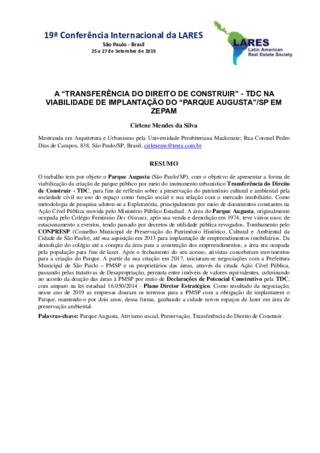O trabalho tem por objeto o Parque Augusta (São Paulo/SP), com o objetivo de apresentar a forma de viabilização da criação de parque público por meio do instrumento urbanístico Transferência do Direito de Construir - TDC, para fins de reflexão sobre a preservação do patrimônio cultural e ambiental pela sociedade civil no uso do espaço como função social e sua relação com o mercado imobiliário. Como metodologia de pesquisa adotou-se a Exploratória, principalmente por meio de documentos constantes na Ação Cível Pública movida pelo Ministério Público Estadual. A área do Parque Augusta, originalmente ocupada pelo Colégio Feminino Des Oiseaux, após sua venda e demolição em 1974, teve vários usos: de estacionamento a eventos, tendo passado por decretos de utilidade pública revogados, Tombamento peloCONPRESP (Conselho Municipal de Preservação do Patrimônio Histórico, Cultural e Ambiental da Cidade de São Paulo), até sua aquisição em 2013 para implantação de empreendimentos imobiliários. Da demolição do colégio até a compra da área para a construção dos empreendimentos, a área era ocupada pela população para fins de lazer. Após o fechamento do seu acesso, ativistas conceberam movimentos para a criação do Parque. A partir da sua criação em 2017, iniciaram-se negociações com a Prefeitura Municipal de São Paulo – PMSP e os proprietários das áreas, através da citada Ação Cível Pública, passando pelas tratativas de Desapropriação, permuta entre imóveis de valores equivalentes, culminando no acordo da doação das áreas à PMSP por meio de Declarações de Potencial Construtivo pela TDC, com amparo na lei estadual 16.050/2014 - Plano Diretor Estratégico. Como resultado da negociação, nesse ano de 2019 as empresas doaram os terrenos para a PMSP com a obrigação de implantarem o Parque, mantendo-o por dois anos, dessa forma, ganhando a cidade novos espaços de lazer em área de preservação ambiental.
The work has as its object the Augusta Park (São Paulo/SP), with the objective of presenting a viability way to create a public park through the urban instrument Transfer of the Right to Build - TRB, for reflection on the preservation of cultural and environmental heritage by civil society in the use of space as a social function and its relationship with the real estate market. As a research methodology, the Exploratory was adopted, mainly through documents contained in the Public Civil Action filed by the State Prosecutor. The Augusta Park area, originally occupied by the Des Oiseaux Women's College, after its sale and demolition in 1974, had several uses: from parking to events, having passed public utility decrees repealed, “Tombamento” by CONPRESP (Municipal Council for the Preservation of the Historical, Cultural and Environmental Heritage of the City of São Paulo), until its acquisition in 2013 for the implementation of real estate projects. From the demolition of the school to the purchase of the area for the construction of enterprises, the area was occupied by the population for leisure purposes. After their access was closed, activists conceived movements for the creation of the Park. Since its inception in 2017, negotiations have started with the São Paulo City Hall - SPCH and the owners of the areas, through the aforementioned Public Civil Action, including expropriation negotiations, swap between real estate of equivalent values, culminating in the agreement of the donation of the areas to SPCH throughConstructive Potential Declarations by the TRB, supported by state law 16.050/2014 - Strategic Master Plan. As a result of the negotiation, in 2019 the companies donated the land to SPCH with the obligation to set up the Park, maintaining it for two years, thus gaining the city new leisure spaces in an environmental preservation area.
